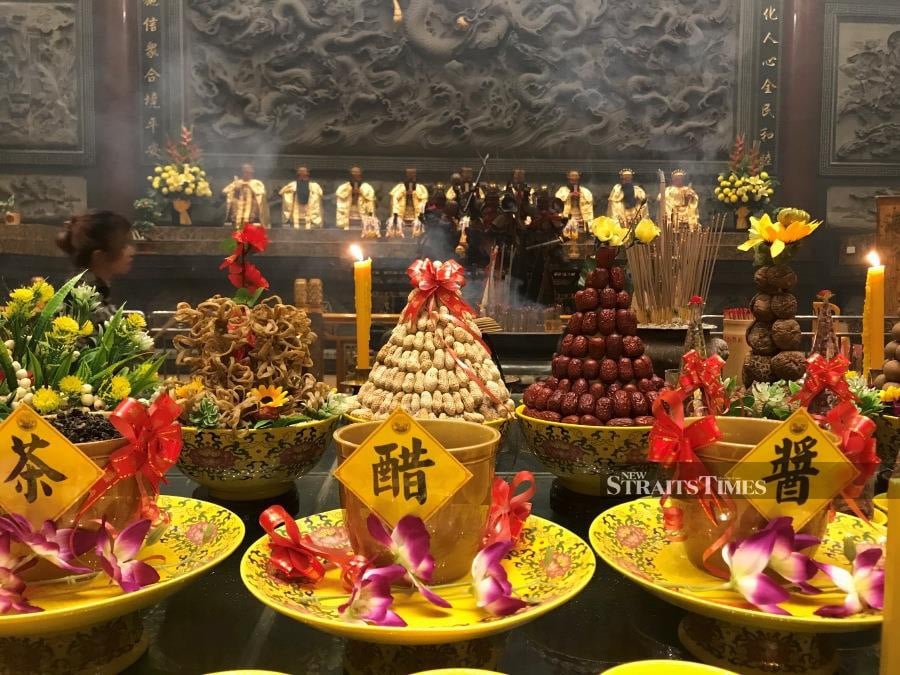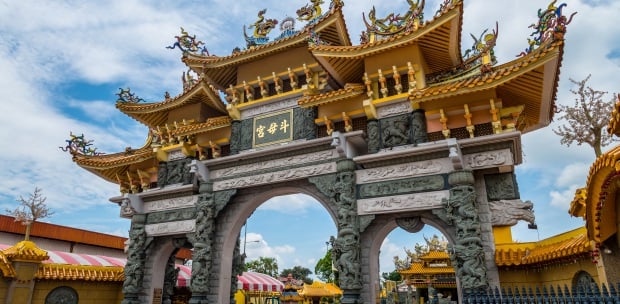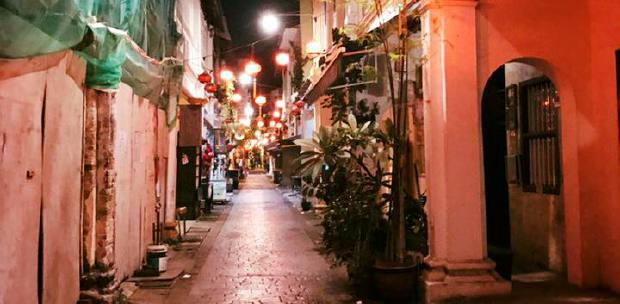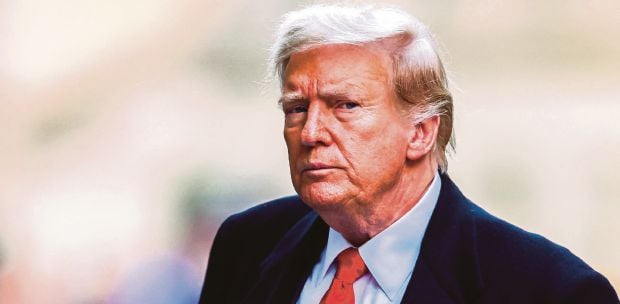BULGING clouds have started to form. Although the moon has retreated into the shadows, yet the mighty sun refuses to steal the limelight. The air of tranquility pervades every nook and cranny.
But before long, the belly of the darkened sky finally opens, and water droplets begin to fall freely, cleansing the ground with its thunderous impact. Free-flowing water drags the dirtiest of all dirt away as the day begins in earnest.
The rain is a welcoming yet familiar sight as the enthusiastic crowd ushers in the arrival of the Nine Emperor Gods Festival, or Kew Ong Ya in the Hokkien dialect, also known as the vegetarian festival.
The very moment the nine-wick oil lamp is placed atop the tallest — and meticulously chosen — bamboo found in the jungle, to signify the impending celebration, the temple would be ready for the influx of devotees congregating on their grounds.
The celebration runs for nine consecutive days, commencing on the eve of the ninth lunar month of the Chinese calendar. Celebrated primarily in southeast Asian countries such as Malaysia, Singapore, Indonesia and Thailand by the Taoist community, it's a major occasion that sees devotees observe a strict vegetarian diet during this period.
THE GODS COMETH
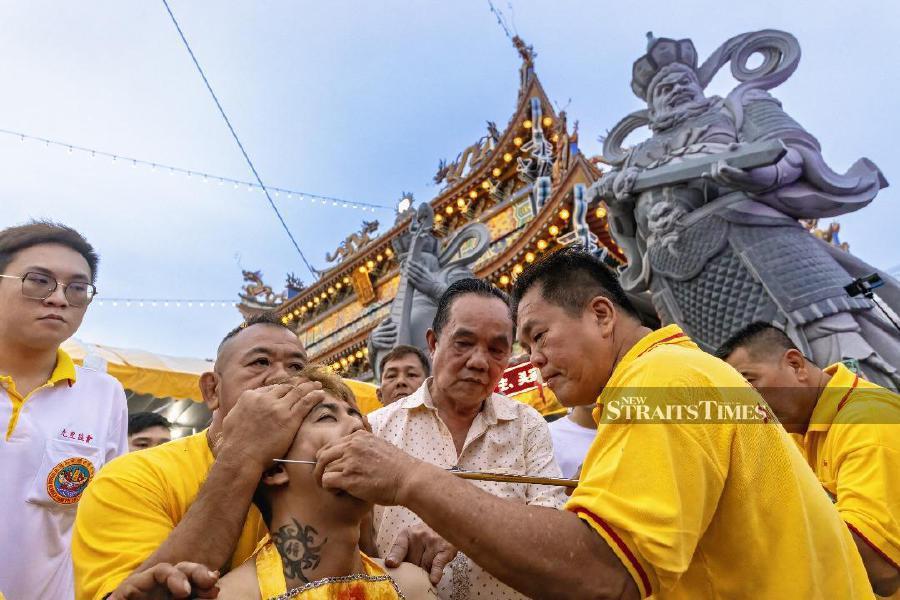
It's said that the Nine Emperor Gods (Jiu Huang Da Di) Festival originated from Fujian, China. The celebration was brought along by Chinese immigrants as they travelled to Malaysia, Singapore, Indonesia and Thailand. Within the context of Taoist belief, the nine emperor gods are the nine sons manifested by Father Emperor Zhou Yu Dou Fu Yuan Jun and Mother of the Big Dipper, Dou Mu Yuan Jun.
It's believed that the gods will descend to earth via the waterway on the eve of the first day, therefore preparations are made and meticulously planned for that occasion. When the night is young, devotees would head towards the temple with their lighted joss sticks as an offering to the gods.
Vegetarian stalls sprouting up around temples and night markets would be packed to the brim, while car parks are filled with vehicles. An air of festivity permeates as devotees look forward to the commencement of the procession to welcome the arrival of the gods.
Friends would meet again after the longest time, while children revel in the joyous occasion. As teenagers huddle on their motorcycles, the elderly crowd too would ensure that their presence is felt. Most devotees would dress in white, while selected mediums would don their yellow attire to differentiate themselves from everyone else.
SACRED RITUAL
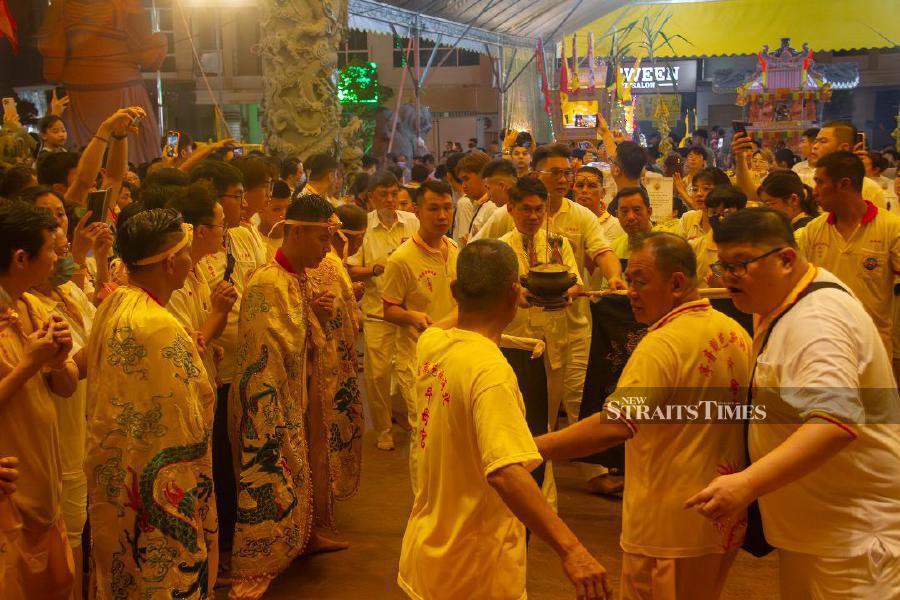
The roaring sound of engines emanating from intricately decorated vehicles, complete with symbols of the dragon and phoenix, mark the beginning of the journey. The handful of towkay (bosses), lo chu (managing trustees) and hu lor (keepers), selected via an election the previous year by the will of the gods, then prepare to take their seats in the vehicle.
One of the vehicles carried the sacred urn, which is protected with the greatest care. The deafening sounds of a lion dance then reverberate across the spacious compound.
The distance to the designated site is far. It's a brisk walk, accompanied by a ballooning crowd lined along the road side gaping at the extraordinary spectacle. There's no age restriction for those qualified to walk.
Once the seaside is reached, some of the mediums would jump into the water in total darkness, searching for key ingredients, which could be found on the seabed. They would later be placed in the sacred urn.
A variety of offerings would be spread on a table set up at an auspicious spot on the beach. The clearest makeshift path is made possible with devotees obediently kneeling beside it as instructions in Hokkien are tossed into the air.
Countless folded joss papers adorn the path, creating a truly unbelievable sight. The stage is finally set. Two lighted candles stuck deep into the sand act like the beacon for the ongoing ceremony.
Between the candles are a number of handpicked leaves sporadically filled with white cream. Joss sticks are burnt and distributed to as many people as possible. The recital of prayers is initiated by the master of ceremony, flanked by his lieutenants.
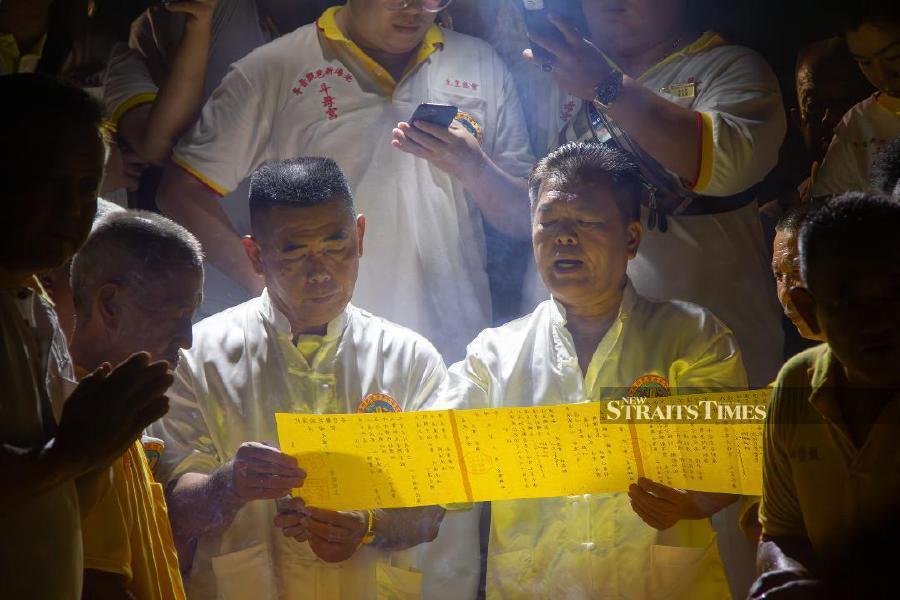
Reading aloud with care from a yellow paper containing the names of the lo chu (managing trustees) and others, not to mention the name of the host temple, the ceremony would continue effortlessly.
All the mediums would be ready to be called upon, yet none would know who'd be the one selected. In the meantime, a pair of red crescent-shaped wooden blocks with a flat bottom that is smaller than the size of a palm is tossed into the air after prayers are recited.
Its fall is cushioned by a sandbox below, with one of the flat bottoms landing and facing upwards towards the sky above. In a mesmerising and astonishing spectacle, some of the mediums would fall into a trance, caught completely unaware by the prevailing circumstances.
Nine of them represent the nine sons of Dou Mu Gong, while a few others represent the monkey god Nezha and others. The urn with the secret ingredients is held up high in the air as jubilant shouts of "Ong, heng, huat!" (prosperity) in Hokkien are heard.
The urn is then escorted to one of the waiting vehicles to be taken back to the temple. This journey is accompanied by the gods and devotees. Walking merrily, buoyed by the feeling of accomplishment, the heart is flooded with joy and tranquility. The mind is as crystal clear as the night sky.
CONVERSATION WITH THE GODS
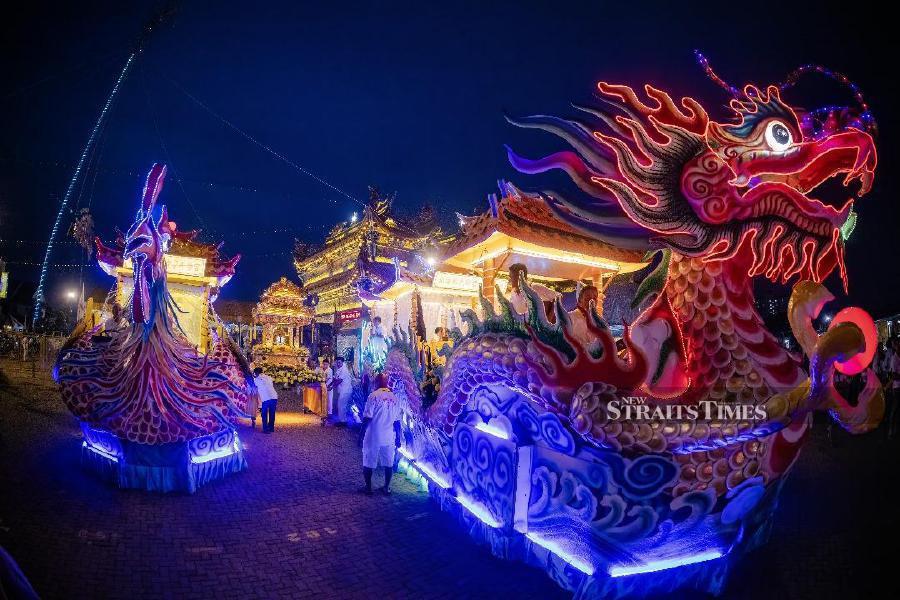
The temple is a hive of activity when the entourage arrives with great fanfare. A lion dance is performed by an energetic troupe who display effortless mastery in their act. The crowd, buoyed by the presence of the entourage, surges forward, but is held back by the officers-in-charge.
The mediums, who are still in a trance, display their unique divine skills, all the while being mindful of the urn that they are accompanying during the auspicious trip. When the urn is patiently escorted by a team of trusted lieutenants, many start to kneel down and clasp their hands in prayer as a mark of respect. Around them, the sounds of beating drums pierce the serene night with ferocious intensity.
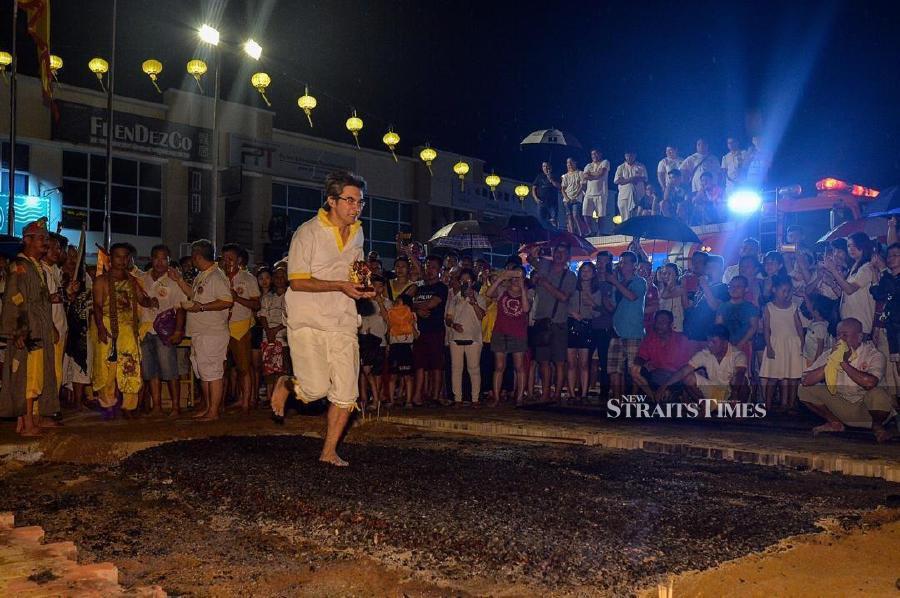
The urn is then brought up to the special room on the first floor of the temple as the energised crowd look on. The mediums then awake from their trance and prepare to leave the main hall of the temple.
Once they depart, others will enter clasping burning joss sticks in their hands. A conversation with the gods is always private and personal. Kneeling down at the main hall, holding the burning joss sticks high above their heads, they'd speak from the heart. Only the gods would bear witness to their prayers.
REVERENCE AND GRACE
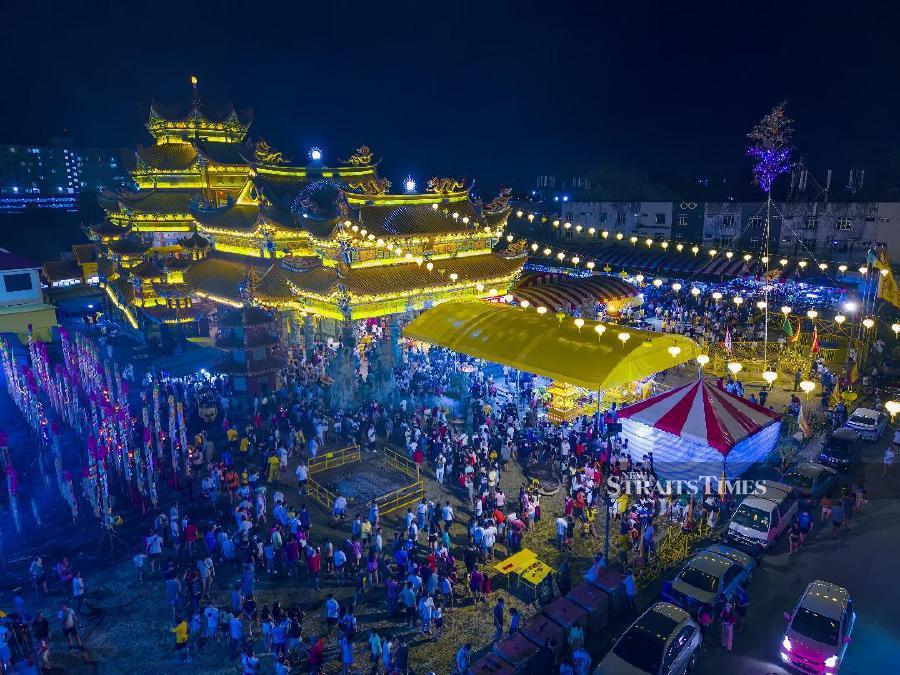
At the main altar of the temple, statues of the nine emperor gods sit majestically facing outwards, with another set of smaller ones sitting in front of them.
Three figures of Nezha (Sam Tai Chu in Hokkien) stand with confidence facing the devotees. On the left would be Tua Pek Khong, believed to be the incarnation of the god Fu from the famed and revered trio Fu Lu Shou, representing fortune, prosperity and longevity.
On the right would be the Goddess of Mercy, the monkey god and the generals of the Five Guardian Posts. Offerings are plentiful on the table, ranging from oranges, folded joss papers, yellow flowers, and stacks of rice and oil to be used for cooking during the festival.
The temple's first floor houses a room where the sacred urn is kept. This room isn't accessible to devotees, except for a handful of officials. Meanwhile, the second floor is where Dou Mu Gong resides, sitting with reverence and grace, flanked by her trusted lieutenants — Pak Tao Sing Kun and Lam Tao Sing Kun (in Hokkien).
Within the temple compound, scores of vegetarian stalls sell their delicacies, with eggs, garlic and onions never being part of the recipe.
From morning until late at night, many volunteers would be in the kitchen preparing meals for the day. The only condition to join the kitchen force is one has to be on a vegetarian diet for at least nine days, besides the ability to utilise the knife, chopping blocks and woks in an effective manner.
Many more volunteers, some due to their position as elected towkay, assist in the celebration in various ways, ranging from arranging the fruits and other important prayer paraphernalia, to clearing away burnt joss sticks and cleaning the temple from time to time. The temple is open 24 hours during the festival.
UNFORGETTABLE SIGHT
Before the eventful night ends, the chosen medium would sit in front of the main entrance and eventually enter into a trance as the beating drums start in earnest. It's the moment to usher in the generals of the Five Guardian Posts.
The ritual is elaborate and also involves the tossing of the pair of red crescent-shaped wooden blocks. If one of the flat bottoms ends up facing upwards, then it's a resounding "yes" to their presence. The ceremony ends auspiciously once blessings have been received from the generals of the Five Guardian Posts.
The ensuing eight days would be filled with colourful parades in the streets, mediums offering divine advice for devotees, more vegetarian delicacies to explore (now being sold not just in temples alone) and the much-anticipated fire-walking ceremony.
The festival ends on the ninth day with the sending-off of the Nine Emperor Gods at the same beach where they descended from heaven on a specially constructed "Emperor Boat".
The replica would be accompanied by devotees who harbour within them hopes for a better tomorrow. The devotees would mark the end of their nine-day vegetarian diet by consuming non-vegetarian food, such as chicken, pork and eggs immediately after the send-off.
Tan Bok Hooi has a postgraduate degree in particle physics and is author of six books in English and Malay. He's an entrepreneur in the area of consultancy, talent acquisition and personalised coaching programmes, focusing on healthcare. He can be contacted at [email protected].


